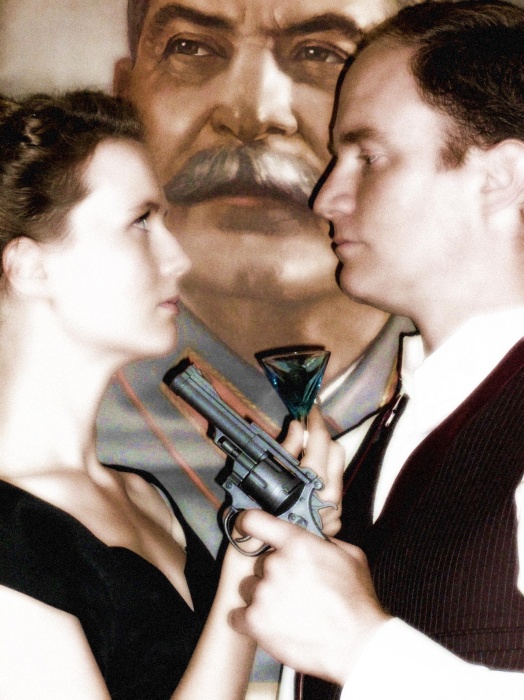The Intrepid Theatre Club offered the perfect intimate space for Cocktails with Stalin, an unlikely pairing of two one-act shows.
Good Night Uncle Joe dives into the thrilling, heartbreaking, and humorous interview of Stalin’s ruthless henchman, Lavrentil Beria. The interview was done by American journalist Anna on March 1, 1953 in Moscow, just as the world was teetering on the edge of nuclear armageddon.

What an entrance: the show opened with Beria, played by Evan Roberts, as a ghost questioning the audience. The only light was a flashlight shone into our faces. The eeriness lifted when his office was illuminated, spotlighting a portrait of Stalin hung on the centre of the back wall.
Roberts played his role with complex emotion and an impressive Russian accent. Beria also did several accents during the show, including British, American, and German, and all of them were superb. I firmly believe this actor can conquer almost any accent.
Anna, played by Randi Edmundson, had an effortless grace on stage reminiscent of Grace Kelly. There was a furious passion about the way she took her shorthand notes during the interview, matching Beria in her ruthlessness in the pursuit of her story.
Next, Canterbury Cocktails was an exciting game of charades laid out in the poetry of Chaucer. I was a little hesitant at first; beyond high school, I haven’t studied Chaucer, and I find Middle English generally needs subtitles. But longtime Fringe performer Julian Cervello made this guessing game a delight, and I found Canterbury Cocktails to be one of the best one-man shows I have ever seen.
Cervello’s grasp of Middle English is impressive, to say the least. He fell into the role of Chaucer with great ease. But even more unique is his ability to translate using actions; his storytelling technique was engaging and quite easy to understand.
Cervello strode and galloped across the stage using props to take on characters from the military, the clergy, the bourgeoisie, and the government, among others. Whether he was using a cane to plow the field or placing a napkin atop his head to suggest feminine piety, his performance was constantly vibrant.
I did find the play’s set left something to be desired. Although the simplicity was meant to reflect the 14th century, it was a bit of a letdown after the posh office of Good Night Uncle Joe’s Beria, where all the furniture seemed to be in just the right place to complement the action on stage.
